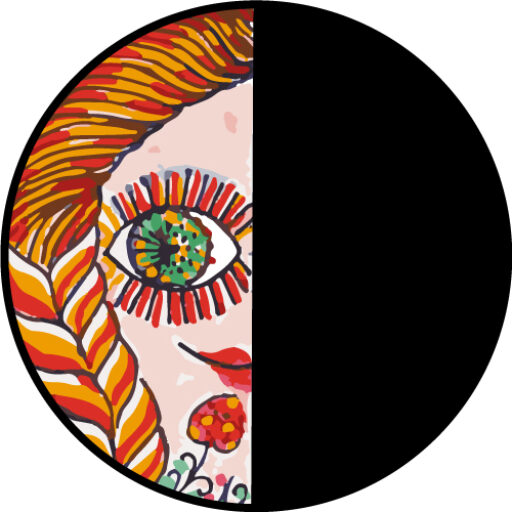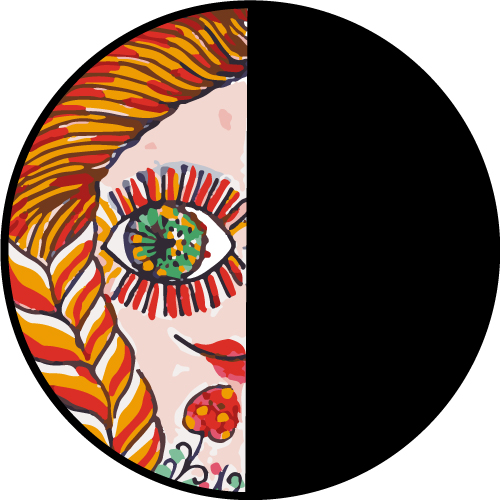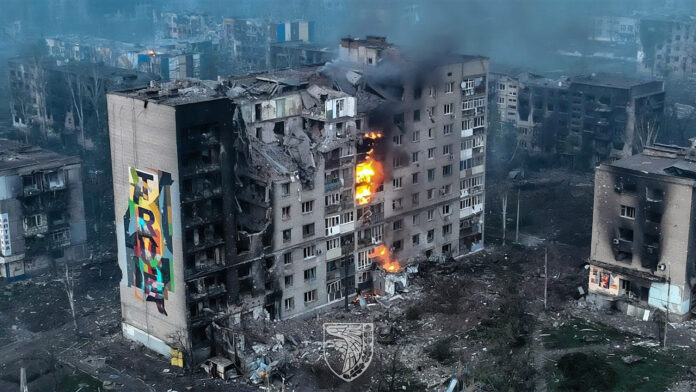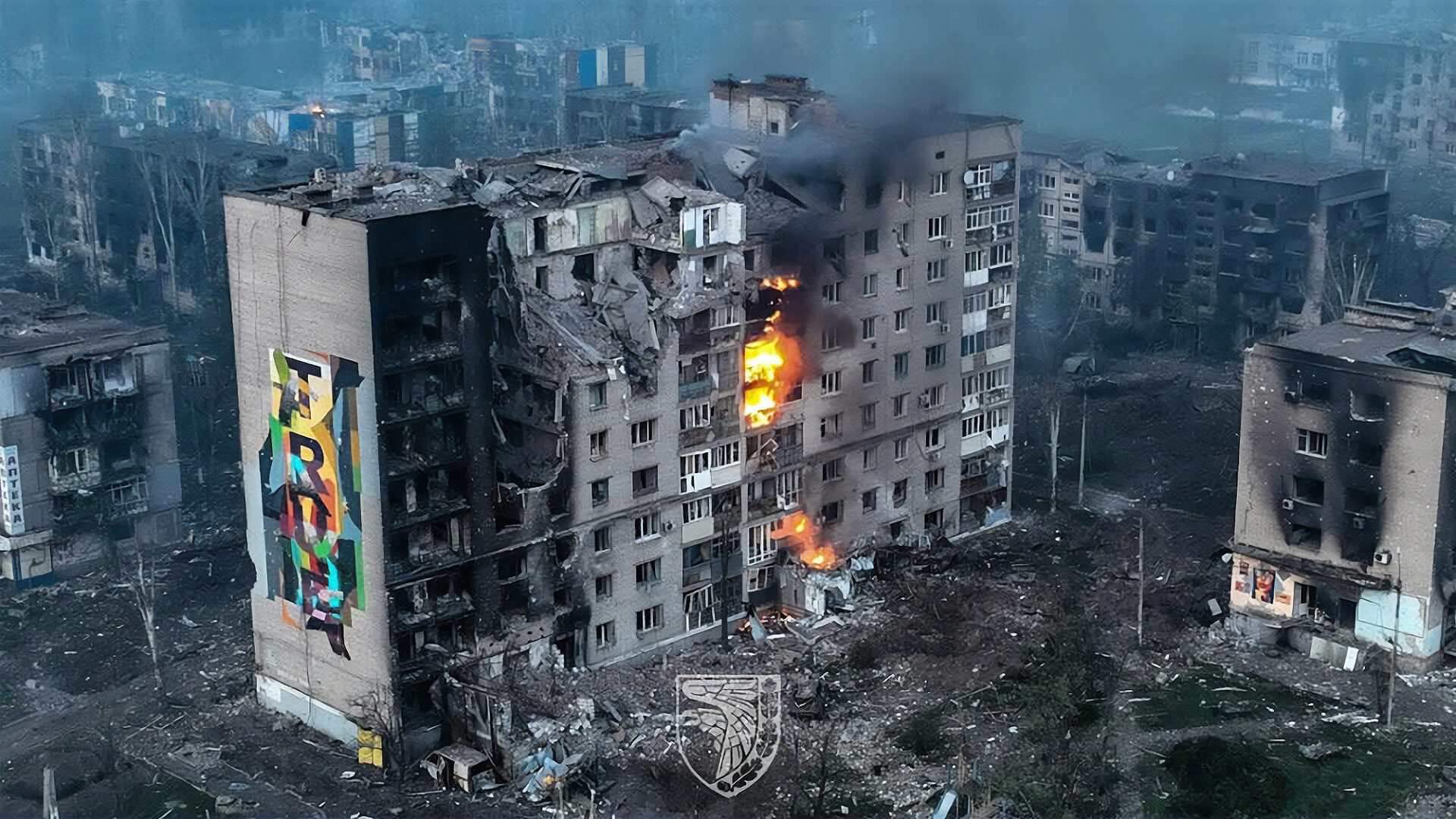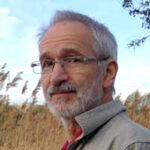Essayist and journalist Jean-François Bouthors examines the symbolic significance of this Pyrrhic victory, based on the capture of Bakhmut by Yevgeny Prigozhin’s militia. For him, the Wagner militia embodies a nihilism comparable only to the ideology of al-Qaeda and Islamic State (IS). It’s the cult of death in the name of a better future, and this cult is not new to the Russian tradition, as Dostoevsky’s novels attest. And the grip of this terrifying ideology on the Russian population will be felt long after the Putin regime is gone.
Last year, we saw the ruins of Mariupol, followed by those of the many villages that Russian artillery pounded to dislodge Ukrainian troops, until not a stone remains standing. Now there are those of Bakhmut, which had some 70,000 residents before the start of the war in Donbas. It’s forgotten, but Moscow had a revenge to take there. In April 2014, separatists aided by Moscow had seized this town almost without a fight, but in July, the Ukrainian army, though not what it has become today, took it back, after fierce fighting. The town was then called Artemivsk (Artyomovsk in Russian), a name it had been given in 1924 to honor the memory of Comrade Artyom, a Bolshevik close to Lenin. His real name was Fyodor Andreyevich Sergeyev (1883-1921), who had organized a military coup in Kharkiv in 1917, before holding high political office in the Donbas region, as well as in the Communist Party of Russia. In February 2016, the Ukrainian authorities returned the town to the name of Bakhmut, which it had borne since its foundation in the 17th Century.
By May 2022, the town of around 20,000 residents came under Russian fire. On August 1, Moscow’s troops, including the Wagner militia, launched an offensive to retake it, hoping to cut off important Ukrainian army supply lines and open the way to Kramatorsk — then a major command center for Kyiv forces across Donbas. It would also have opened up access to Sloviansk, following the capture of Severodonetsk and Lysychansk in early summer 2022. From Fall onward, Wagner’s chief Yevgeny Prigozhin made it his personal business to succeed where “Moscow bureaucrats” and Russian army chiefs had failed. Since then, the Battle of Bakhmut has become both an appalling human tragedy and a spectacle projected daily on screens the world over, via social networks and 24-hour news channels.
On this stage, Prigozhin has camped out day in day out, blowing hot and cold — and very often ignoble. He set himself up as President Zelensky’s media rival, in contrast to the Kremlin’s very “Soviet” communication style, displaying growing political ambitions, with decidedly populist overtones, even if it meant gilding his armor on the backs of Russia’s Defense Minister, Sergei Shoigu, and his Chief of Staff, Valery Gerasimov, by insulting them copiously. He even seemed, with barely concealed words, to take aim at Vladimir Putin, in order to obtain the extra ammunition and support he needed to conquer the whole city and proclaim that he controlled it “legally” — as if the most savage brutality should have the force of law.
A great actor, Prigozhin has played every part. He has been seen recruiting inmates in Russian prisons; as a promoter of the “meat grinder” he deployed in an attempt to overwhelm the Ukrainian resistance with waves of assaults designed simultaneously to exhaust their ammunition and morale, and to pinpoint pockets of artillery resistance; as a leader moved to the very depths of his being by the sacrifice of his men — in stark contrast to Vladimir Putin, who coldly let the crew of the K-141 Kursk nuclear-powered cruise missile submarine die in August 2000, refusing foreign help to rescue them; as a ruthless kingpin, threatening cowards with a sledgehammer after a video of a deserter’s execution was broadcast; as a magnanimous commander praising the Ukrainian resistance; as a furious gnome barking, in close-up, against Moscow bureaucrats, calling the Russian people to witness their incompetence, cowardice, spinelessness, and greed.
In Bakhmut, Prigozhin not only fought a fierce battle but also put on a show of unimaginable nihilism, the equivalent of which has only been seen in the ranks of al-Qaeda and, above all, IS. The emblems brandished by his militia are as black as those of the henchmen of Islamic State. His color is that of death, and when he claimed the final victory on May 23, after announcing it many times, he did so by framing the Russian flag with his own, on either side, like two wings as dark as they are sinister.
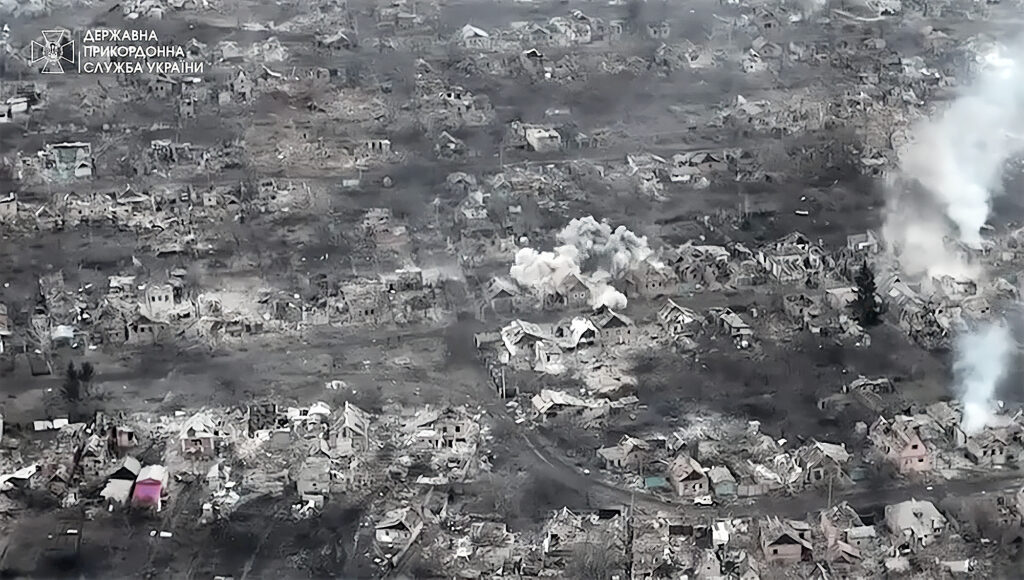
This is where the battle of Bakhmut differs from that of Mariupol, which was already appalling. It has apocalyptic value, revealing the Putin project beyond the loquaciousness and cynicism of Wagner’s leader, who, whatever his ambitions, is only one of Vladimir Vladimirovich’s instruments. It’s not just a question of restoring the Soviet empire, which has collapsed in on itself, in a long agony that began in Poland in August 1980, with the birth of Solidarity. Nor even a return to the Holy Russia of the Tsars. And if Stalin is a claimed model, it’s for his ability to make himself feared urbi et orbi, stopping at nothing to make his power felt. The images from Bakhmut say it all: the will to rule by death. As long ago as 2006, Putin imposed a black uniform on the FSB, in reference, in particular, to that of the Oprichniki to whom Tsar Ivan The Terrible had entrusted the task of sowing terror to reduce any hint of opposition.
The landscape of Bakhmut is one of total devastation, the stark manifestation that for those who perpetrated this horror and those who willed it, the death of others is preferable to life and liberty. This disaster is not a secondary effect of political will, nor is it merely the tool by which political will manifests its implacable character. It seems that in Bakhmut, ends and means are one and the same. What is intended is death as the very essence of power. It’s not just a question of bringing Ukraine back into Moscow’s fold, but of subjecting it to the most nihilistic logic of all, by implementing death on a massive scale. What Putin wants, since the setbacks from which he has not recovered in 2004 (the “Orange Revolution”) and 2014 (Euromaidan), is to make Ukraine pay for its claim to live free, outside his power. The ruins of Bakhmut bear the message that, for him, life outside his will is permanently impossible. This is why what he calls “Western hegemony” is unbearable for him. Because it is opposed to the transformation of the world into a hunting ground for predators of all kinds, who recognize one another and occasionally ally themselves whenever it suits them.
The nihilism exemplified by the total destruction of Bakhmut has long found room to flourish in Russia. Dostoevsky set out to make this point in 1869, when he wrote Devils. At the start of the novel, we learn that Stavrogin, the central character, is driven by love of his homeland, just like Putin, who never stops repeating that he is acting for the good of Russia and the world. But the very nature of this love, so to speak, that Stavrogin claims, is that he sees no other way to realize it than to choose the death of others. Starting with those he manipulates and embroils in his mad passion. He himself ends up hanging himself after cowardly fleeing. We’ll see what happens to Putin when his mad race comes to an end.
The Russian writer’s preference for death, including that of loved ones, had already been dramatized at the end of his previous novel. In The Idiot, Rogozhin murders Nastasya Filippovna to be the only one to possess her. “We won’t let anyone take her away,” he tells Prince Myshkin in front of her corpse. But how can we not think, from this scene, of the words Putin addressed to Volodymyr Zelensky during the news conference he held in the Kremlin with Emmanuel Macron on February 7, 2022: “Like it or don’t like it, it’s your duty, my beauty”? Note that in this vulgar chastushka, inspired by Sleeping Beauty, the one who has to endure “sleeps in the grave”.
This apocalypse of death, of which Prigozhin is the first rider, is not confined to Ukraine. In Bakhmut, over the last five months, according to US figures, 20,000 Russian fighters are believed to have died in combat and another 80,000 to have been wounded. Since the start of the so-called “special military operation”, Russian losses have exceeded the volume of troops massed on the border in the preceding months and weeks. Vladimir Putin is bleeding his own people dry, in addition to the massive flight of all those who have chosen, for good or bad reasons, to keep their distance from this madness. Russia lacks so many vital forces at a time when, simply because of a war that is turning into a nightmare for the army, its economy is suffering a considerable drain on its production capacities and reserves — not to mention the effect of international sanctions. The whole country is caught in the deadly grip of Putin’s madness. The immediate effects may be appalling but the long-term consequences will be no less so, not only materially, but also psychologically for millions of people, and not only for those who have returned from the front or for families who have lost one or other of their loved ones: the delirious propaganda rolled out like a steamroller by the official media disseminates the Kremlin leader’s death wish and fantasy of omnipotence in people’s minds. This poison — which is spreading far beyond Russia, notably in the so-called “Global South”, but also here at home, via social networks — will be felt for a long time to come. In addition to the considerable mental damage inflicted by Stalinism, as described by Svetlana Alexievitch in Secondhand Time: The Last of the Soviets, we must already add that of Putinism.
Jean-François Bouthors is a journalist and essayist, contributing to the magazine Esprit and serving as an editorialist for Ouest-France. He is the author of several books, including Comment Poutine change le monde published by Editions Nouvelles François Bourin in 2016.
